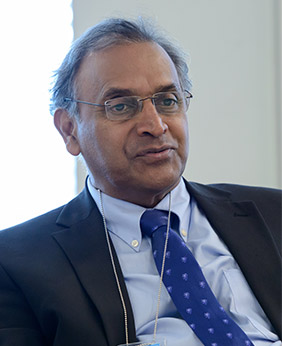“Secret Recipe” of the NPT Longevity: Dr. Vladimir Orlov on the importance of the Treaty on the Non-Proliferation of Nuclear Weapons
Dr. Vladimir Orlov,
Founding Director of PIR Center, Professor at MGIMO University
May 11, 2025
The gavel of the chairman, the experienced Sri Lankan diplomat Jayantha Dhanapala, struck the podium: “So, it is decided”. I remember this historic moment, as if it were yesterday, even though it was three decades ago. It was May 11, 1995.
The UN General Assembly hall was packed, with the future of the Treaty on the Non-Proliferation of Nuclear Weapons (NPT), the cornerstone of the entire international security architecture, was at stake.
171 delegations of UN states parties (there were 179 NPT states parties in total at that time) were waiting for a decision. The treaty itself had been drafted by its founding fathers in 1968 in such a way as to allow for three scenarios: renewal for a fixed term; renewal for successive terms, in between which decisions on its future would have to be taken; and indefinite extension.
After four weeks of intense battles and hard work behind the scenes, despite the initial strong opposition or soft skepticism of quite a few states – from Mexico to Egypt, from Indonesia to Iran – the delegates to that historic conference managed to reach a decision to extend the NPT indefinitely, with the adoption of a number of related documents that satisfied the skeptics. Among them, I would like to emphasize the resolution on the Middle East, which called on all states in the region (including Israel, although it was not named in the text) to join the NPT. The main achievement was that the package was adopted without a vote, practically by consensus.
As Jayantha Dhanapala explained to me on the day of the extension, “the decision taken by the vote would have been a fatal blow to the NPT, since then we would have found ourselves in a house divided. What a wisdom! We managed not to humiliate or alienate the skeptical minority (the DPRK was the only delegation that “accidentally” left the room when the decision was made). The subtlety, however, was that the only legally binding decision was the indefinite extension itself; the other documents were of a recommendatory nature.
The indefinite extension of the NPT 30 years ago was an impressive triumph for all those who had been working for the strengthening the global security.
The NPT review process has continued unabated since then, but its participants – now all the world’s states (with the exception of just four) – may not be distracted by scholastic discussions about the “fate of the treaty”, but rather focus on practical details to make it more effective. This is far from always the case. But the fact that the NPT is still in demand around the world, and will remain so for decades to come, is an indisputable fact.
The indefinite extension of the NPT was also a success for Russia, a depositary state, as Moscow, by the very text of the treaty, is entitled with the exclusive rights to legally possess nuclear weapons, which only four other countries have.
Besides, the proliferation of nuclear weapons along Russian borders, whether in the Middle East, the Far East, or Ukraine, is contrary to Russia’s vital national interests. I remember that Russia that year sent a “star delegation” to New York: Sergey Kislyak, Generals Gennady Evstafiev and Evgeny Maslin…
The role of the Russian delegation was extremely important for the successful outcome of the conference. I don’t remember any episode when the Russian delegation was inflexible or did not promote compromise.
But multilateral diplomacy, if it is focused on results, is not a game played alone, it should be played only in a partnership. And the Russian participants would certainly recall the details of Russian unprecedented cooperation with the Americans in order to reach an indefinite extension: both on the eve of the conference and during its proceedings, and even in the hours that preceded the “victorious” stroke of the chairman’s gavel and when everything could have been derailed by a footstep on the part of one of the influential states.
Both delegations went to great lengths to get a perpetual NPT. Why? Because Russian and American interests coincided there. But diplomacy would have stalled if there had been no political will from the top. Only when decisions are made jointly by the Kremlin and the White House, diplomats can succeed in unleashing their talents and achieving tangible results. This is the secret recipe for the solid foundation of the NPT and for its enviable longevity.
This article is based on the column by Dr. Vladimir Orlov in Kommersant Daily, which was first published on May 11, 2025.
Keywords: NPT; Nuclear Nonproliferation; Global Security
NPT
F13/AST – 25/05/11



